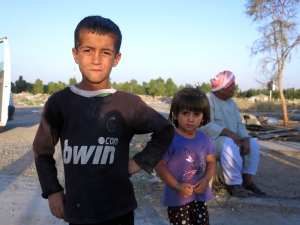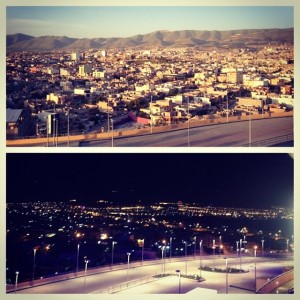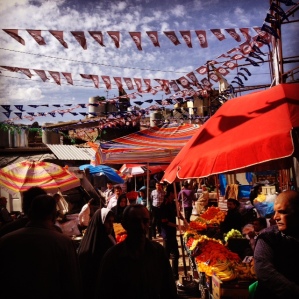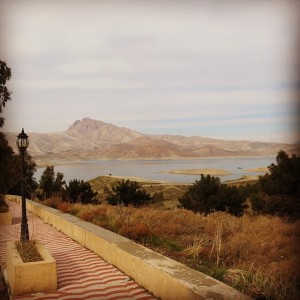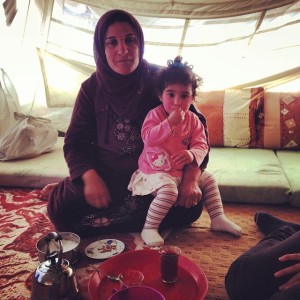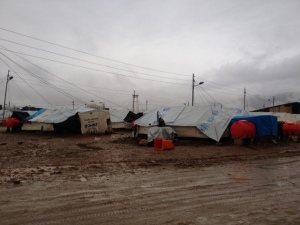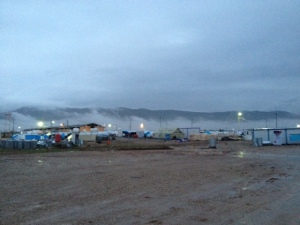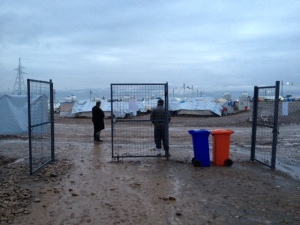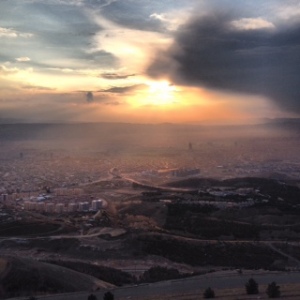Last week I was taking a share taxi from Erbil to Duhok, a journey of about two and a half hours made more difficult because of the roundabout journey you have to take to avoid Mosul. Halfway there, my driver decided to switch me to a different taxi because he had to make a detour into dangerous territory. My new driver set off at a breakneck speed, as though someone had challenged him to see how fast he could make the journey. At the last checkpoint before Duhok, we were pulled over for a significantly longer delay than usual.
“Where’s your passport?” the checkpoint officer asked me.
“What?” I responded, blankly. With a residency card, I never travel with my passport, as it’s unnecessary and it seems rather a lot safer to keep it at home. “In Suli,” I said vaguely. The officer frowned. Then he turned to the guys in the backseat. They unfortunately, in addition to not having their passports, appeared to be unregistered refugees or in some similar situation. The three of them (including two younger boys) were pulled out of the cab and questioned by police. In all of the taxis I have ever taken in Kurdistan, no one has ever been removed from a cab and sent back to their starting point with a police escort. Until now.
The changes are subtle, but they’re there. It starts with a vague warning from the government (passed on through various NGO friends) that Da’esh (the derogative term the Kurds and Arabs use for the Islamic State or ISIS, and one that I will happily use if they are insulted by it) is now ‘officially’ targeting civilians and public spaces. Right, avoid the bazaar. We can still go to the beer garden though, right? And it moves from there to canceling plans to travel to areas that may be more dangerous than usual: Halabja, Kalar, Chamchamal.
These warnings frustrate me more than scare me, because in order to do the job I want to do properly and well, those are the places I need to go to. But I still won’t risk it.
And then there is the inevitable guy who squishes into your share taxi and throws his AK in the trunk with your groceries, or just props it against the back of your chair so when you glance back, you realize you’re staring into the barrel of semi-automatic weapon that is clearly loaded. Safety, indeed.
Before I came back to Kurdistan, I was worried about how I would feel here. And for my first few days, I was nervous – to tell drivers making banal conversation where I was from, whether I was married, who I worked for, or to venture into the bazaar on my own. Or take a taxi to a different town I hadn’t visited yet to find information from people I’d only had the vague sense that existed.
These feelings eventually wore off, for the most part. I’ve written before about violence and detachment on here, and that’s not exactly what is happening this time, but rather a certain level of, well, acknowledgement that, yeah, it’s not the same as it was before, that there is a tension now, that yes, things are dangerous, but that doesn’t mean I’m not going to leave my house.
To do the job that I want to do, I travel across the region and try to sense these differences in the people that I meet and speak to. Sometimes I feel like there are only so many times I can ask what has changed in the time of conflict, and expect a different answer. And sometimes I can’t believe my own impatience when I ask the eighth or twelfth group of refugees how they feel or what they expect will happen: because of course they all feel lost, and worried, and hope they will be able to return home soon.
I have never, really, been in favour of military intervention in foreign countries. And I expect many people will disagree with me when I state my support now of Western air strikes and military support. Because as much as we can bitch and complain and point out how it’s already the West’s fault for what happened here, that doesn’t matter in the face of events happening today. I have met so many people – so many! – in the last three weeks who have come to Kurdistan with nothing, out of complete and utter fear: Yazidis who barely survived the massacres of Mt. Sinjar; Arabs from Fallujah who are terrified of winter in the mountains and worry they’ll have to return to their city, even though it’s still under siege; kids living in the broken glass and rebar of construction sites without shoes; mountain villagers clearing landmines themselves that have been there for decades, while Da’esh lays new ones in the west; Assyrians who look over the Mosul dam reservoir waiting for the day Da’esh strikes again; those frightened displaced boys in the back of my taxi who were sent back to wherever it is they came from.
And in the face of this, I cannot be against intervention. I am tired of seeing the broken, exhausted faces of people who have nowhere else to go, and I’ve been back less than a month. No matter how you read between the lines, the events happening to the west and south of Kurdistan and across into Syria are horrific. There is no reasonable side to Da’esh. And for those who argue that they arose out of a vacuum left by the last ‘intervention,’ yes, that is true, but that doesn’t help us move towards an end to these atrocities. And to stand by and watch the humanitarian crisis unfold and do nothing – well, inaction, in this case, is only perpetuating the crimes.
I don’t think we should compare horrors that occurred in the past to what is happening today – but for a moment, maybe we should pause and think about Rwanda, or Halabja.
I think humanitarian intervention is a difficult theory and a slippery slope and easy to criticize from the comfort of our homes across the West. But I also deeply believe that nothing will change here unless there is external support. The Iraqi government has already fallen apart, the peshmerga are spread thin, and the Syrian Kurdish rebels are brave as hell but getting tired. I’m starting to get used to that guy in the back of the cab with his AK, and somehow, inexplicably, I’m starting to feel safer for it, even though no part of me ever would before.
I don’t want to live in a world where security is defined that way. It’s completely absurd. But winter is coming, Da’esh is out there, and this isn’t going away.



